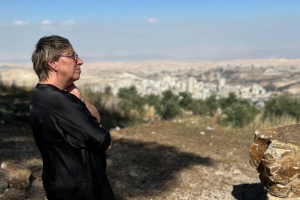Belgium donates 20,000 mpox vaccines
Belgium is donating 20,000 mpox vaccines to the Democratic Republic of Congo (DRC), the country that is currently on the frontline of the mpox epidemic. This was decided earlier today at the Federal Council of Ministers, following a proposal from Deputy Prime Minister and Minister of Health Frank Vandenbroucke and Minister of Development Cooperation Caroline Gennez: "We call on other European countries to do the same."
Although mpox has been endemic in the region for decades, the current rapid spread of the virus in Central Africa has been a cause for concern. The Africa Centres for Disease Control (Africa CDC) reports that since the beginning of this year, there have been some 24,000 suspected or confirmed new cases of mpox in 13 African countries. More than 600 people have already succumbed to the disease – the vast majority of them in the DRC.
That is why the World Health Organization (WHO) has declared the epidemic a global health crisis and has launched a plan to contain the spread of the virus as soon as possible. Belgium is now responding to the call of the WHO, the EU and the DRC to donate part of its own stock of mpox vaccines, so that the people in the DRC who are most at risk can be vaccinated as soon as possible.
Minister Vandenbroucke: "There is a serious emergency in Africa. The virus is claiming more and more victims. Moreover, viruses cannot be stopped by national borders. In Belgium, we are monitoring the situation closely and it is reassuring. This allows us to use part of our stock for the people in the affected regions. Of course, we have already taken steps to replenish them so that we are ready should the situation in our country change."
In addition, the Belgian development agency Enabel will focus part of its cooperation programme in the DRC on the fight against the epidemic. Enabel staff will support the local authorities in raising awareness among the population, preparing for possible vaccination campaigns, detecting new cases, and treating patients.
With this donation, our country reaffirms its pioneering role in international cooperation in the field of health. It was also Belgium that sounded the alarm about mpox with the European Public Health Authority (HERA), which enabled a European donation of 215,000 vaccines. The first doses of that donation arrived in the DRC yesterday. Belgium and the partners of the Belgian development cooperation will also help with the coordination and administration of the vaccines in the field.
"We can count on an extensive network in Central Africa, and especially in the Democratic Republic of Congo," explains Minister Gennez. "One of the priorities of our EU presidency has been to build a more equal partnership between Europe and Africa, by working more closely together on health. We were able to set up new contacts at the Africa CDC, which coordinates the response to mpox in Africa. We are now seeing the results of all that work and are once again proving that international solidarity works. Only by working together and joining forces, across borders, can we effectively combat the mpox epidemic."
This also applies to scientific knowledge about the virus. With the support of the Belgian Development Cooperation, the Institute of Tropical Medicine (ITM) in Antwerp has been conducting research into mpox for years. The institute does this in close collaboration with the Congolese Institut National de la Recherche Biomédicale (INRB). It was scientists from ITM and the INRB who were the first to identify the new variant of the virus.

